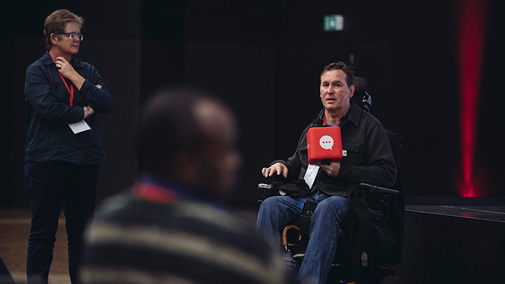Kevin Stark, from United States, suffered a C3 and C4 spine injury seven years ago, and shared his experiences of making the transition from acute treatment to long term care. Initially paralysed from the shoulders down, Kevin was able to gain some use of his arms and leg and thanked all physical therapists for the difference they make to people’s lives.
He described physical therapists as ‘being pushy but in a nice way’. Following an intensive two-year period of treatment in hospital, Kevin went through a ‘physical and spiritual rebuild process’. He described his experience of leaving hospital as if he were ‘leaving this wonderful safe cocoon’. He was anxious about what was going to happen next and how would he cope away from ‘the state-of-the-art hospital facilities’. He was reassured that a good physical therapist with basic equipment could do wonderful things and he found this to be true and was able to live independently three years after the injury.

He believes it is vital to prepare people for the transition from hospital, and that physical therapists have an important role to play in helping support this key milestone. Another key learning point he wanted to pass on was the concept of spiritual rebuilding. With a scientific background and a doctorate, Kevin had travelled the world and enjoyed cycling and hiking before his injury, and wondered how this would be replaced after the injury. When he met his wife Jamie she showed him he should aim to ‘thrive not just survive’. As a result he discovered new passions such as painting and charitable work. He realised he had just been surviving and that living independently was not the finish line. Kevin is now a board member of a non-profit organisation and is working on an educational system to inspire children with particularly challenging lives.
His key message to physical therapists working with people living with long term conditions is to investigate what will make people thrive.
The other panel members supported Kevin’s views by challenging physical therapists to really listen to people and what they want from life. Alison Hoens, from Canada, described the difference between her needs and that of her daughter’s as they both live with rheumatoid arthritis. Alison uses voice recognition software for computer use but her daughter prefers to type with compression gloves. While Alison would recommend her daughter do some formal exercise, her daughter would rather conserve her energy so that one night a week she is able to go to a nightclub with friends and dance for 20 minutes.
Janet Thomas, from Scotland, highlighted how one woman in her 80s wanted to continue Scottish country dancing despite having frequent falls. Janet was unsure of this approach to exercise but she could see how important it was to find a solution. The woman is now able to do some of the key moves, using a stick for support.
Anneli Cattlean, from Switzerland, shared her experience as the mother of 21-year-old son living with Duchenne muscular dystrophy. Anneli talked about the importance of physical therapists thinking creatively about different types of therapeutic activity for people living with long term conditions and to always look ‘around the corner’ for the next technique that could bring even more quality of life. She has been ambitious for her son and believes it is this constant strive for new ideas that has given him the level of independence he now enjoys.
Haleluya Moshi, from Tanzania, raised the important point that a significant challenge for physical therapists is in encouraging people with long term conditions who are not perceiving signs of progress to keep returning for more treatment. Maintenance is key and people should be encouraged to see maintenance mobility work as important and as progress. Haleluya also wanted to highlight the importance of access to rehabilitation for people in low income countries and that physical therapists have an important advocacy role to help improve this situation.
Alison concluded the session by encouraging physical therapists to focus on how people feel about their long term condition and what they want to feel in the future as part of goal-setting. She quoted Maya Angelou: ‘People might not remember what you said, but they will remember how you made them feel.’

